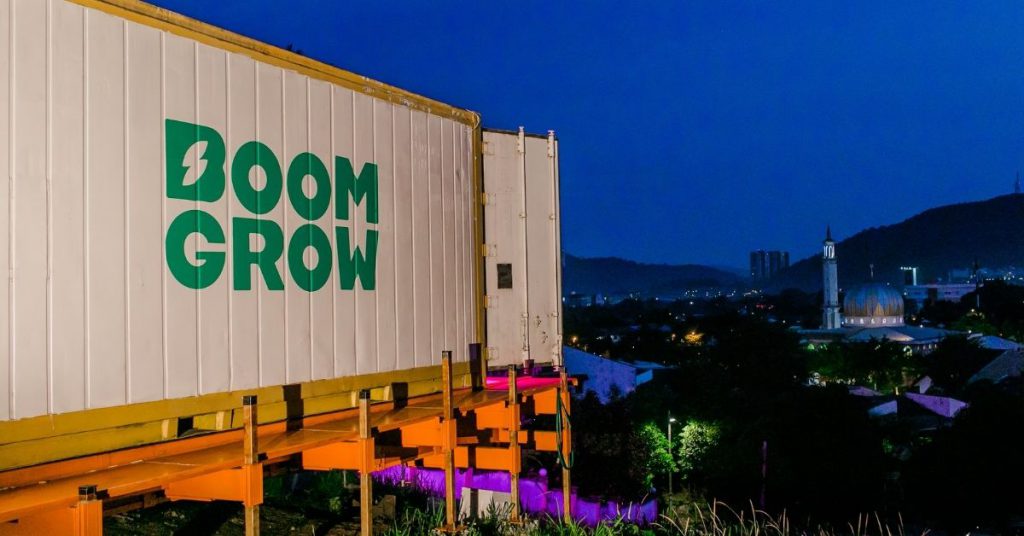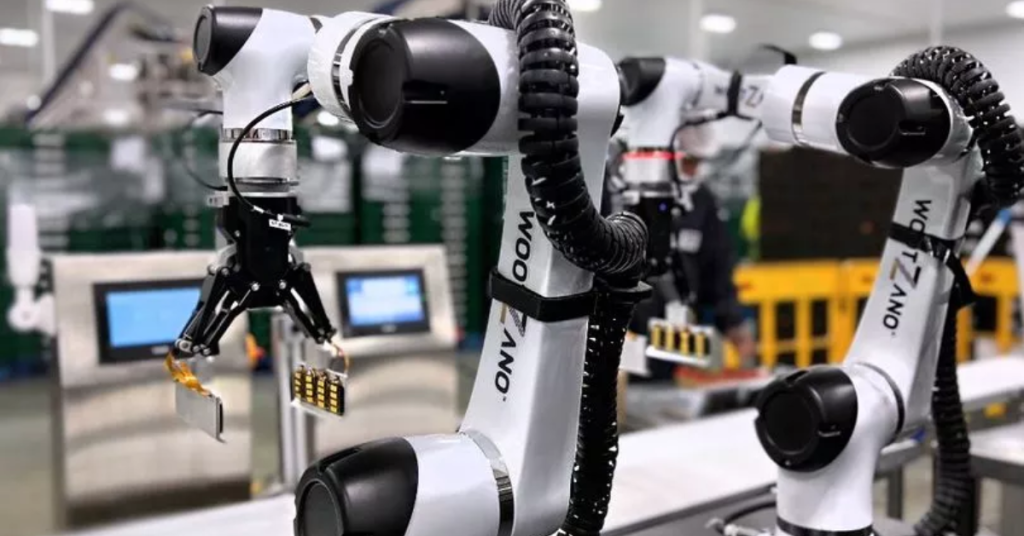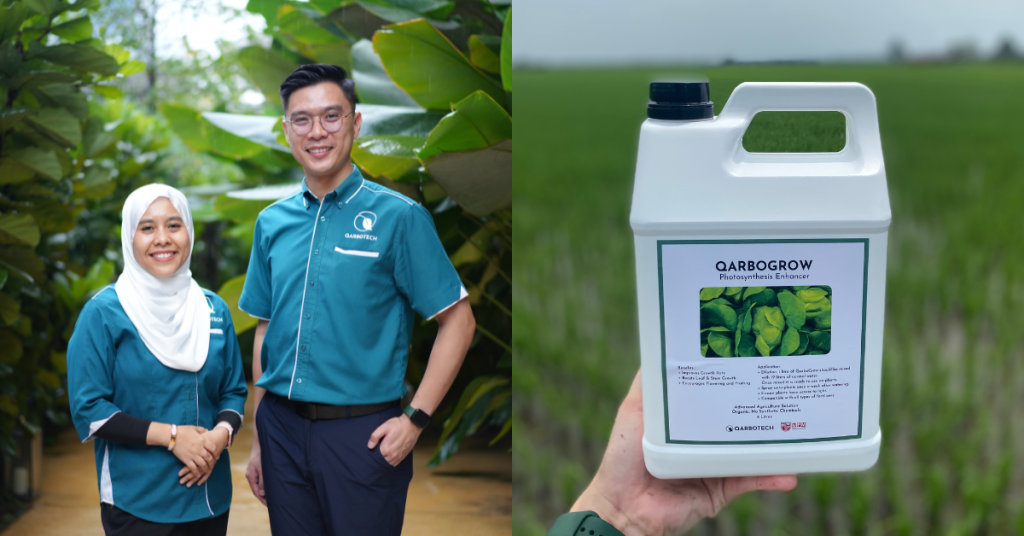It’s no surprise that agriculture is a huge industry in Malaysia. Contributing around 7.1% to the country’s GDP back in 2021, it’s undoubtedly a key part of our economy.
However, much of the industry has been largely left unchanged over decades. In order to stay ahead of the curve, there must be more innovative solutions from startups.
With that in mind, one of the panels at the recent KL20 Summit had been all about agritech. Here are three agritech startups that were highlighted, and how they’re solving the agriculture labour crunch in Malaysia.
BoomGrow: Anyone can farm
A homegrown startup, BoomGrow is rethinking farming through smart containerised farming systems. In these modular, plug-and-play systems, factors like water, light, and humidity can be adjusted to ensure the utmost consistency of output and yield.

Essentially, they are removing unpredictability and uncertainty, and allowing for precision farming.
“We are stripping away the uncertainty in an industry that’s only been uncertain forever, that’s what technology has enabled us to do,” elaborated BoomGrow co-founder Jay Desan.
The startup is also all about being hyperlocal and putting their farms where consumers want and need them. The truth is, many of our foods need to travel hundreds if not thousands of kilometres just to get to us, resulting in lots of carbon emissions.
At the same time, BoomGrow’s farming system is highly cost-optimised, thus creating a financially and environmentally sustainable solution.
Wootzano: Automating farming
Based in the UK, Wootzano produces highly dexterous robots that can work like human beings in a production line.
These robotic arms can pick, sort, and grade produce while looking for issues, diseases, or other specifications.

The company just recently ventured into Malaysia, which is the first Southeast Asian country they’re active in. Currently, the robots are already being deployed for bird’s eye chilis, a crop that CEO Atif Syed said is in dire need of automation.
“Labour is an issue everywhere,” he said. “Not just in developed nations. What was surprising to us was even in developing countries, labour has been quite hard to find. People are not willing to do the job, where these jobs can be very monotonous, mundane, repetitive.”
That’s why solutions like Wootzano’s are so vital. Not only do the speed of the robots match that of humans, they also have cost parity. That’s right, the pricing is actually equivalent to hiring a human being.
Qarbotech: Empowering farmers
Present on the panel was also Suraya Abdul Rashid, who invented a solution that is being sold by the company she founded, Qarbotech. She used quantum dot technology to create a solution that helps plants grow better.
In late 2023, the company received US$700,000 in seed funding and grants to scale. The round was led by 500 Global, while the grants came from the Singaporean government-linked Temasek Foundation, and Malaysia’s Khazanah Nasional.

“Photosynthesis is an inefficient process,” she said. “Only 2% of light is being utilised during photosynthesis. So what we have is a photosynthesis enhancer.”
Essentially, Qarbotech’s solution helps plants absorb more light, hence increasing plant growth and yield.
While yield enhancers aren’t completely novel, Qarbotech’s solution puts smallholder farmers in the spotlight rather than sidelining them as it’s very easy to understand and implement.
As Suraya pointed out, in SEA, there are an estimated 100 million smallholder farmers. When they are exposed to climate crises such as prolonged monsoons and hot weather, they end up experiencing a huge drop in their productivity.
And that means, for the average farming family, less food on the table, and less money for education and health, trapping them in the poverty cycle.
Where we’re headed next
So, we’ve got three companies doing cool stuff in the agritech sphere. So what?
Obviously, there is much still to be done. Many more gaps can be filled in the market, as pointed out by another panellist, Singapore-based Tin Men Capital’s Murli Ravi.
He pointed out that the other panellists mainly focused on on-farm solutions that touch on life sciences, robotics, IoT, and the like. But he said there are lots of ways tech can be applied to pre and post-farm operations. We must look at the entire value chain, from supply to financing to retail.
One key thing he advised looking into as well is waste reduction.
“I think the world has enough crops to feed everybody, but we also know there are many people who are starving out there,” he said. “And the reason for that is not because we don’t have enough crops today. We don’t actually need to get more farms. We need to reduce wastage.”
But all in all, the panellists agreed that Southeast Asia is primed for lots of innovative growth when it comes to agritech, and Malaysia is of course at the centre of it all.

But to get us to the next chapter, there needs to be more integration and unity within the ecosystem.
Jay said that there is an “us versus them” sort of mentality within the industry, referring to startups and traditional businesses.
“Agritech, this whole tech thing, is seen as an external thing,” she said. “We need to be seen as integrated as one, solving a problem across the value chain. That kind of ecosystem is fundamental.”
Another player that must come in is the government. Atif said that the government must help to derisk agritech efforts in order to enable the integration of said technology.

“We actually have such few companies that have succeeded in agritech compared to fintech or ecommerce in this region particularly,” Jay said. “And it’s simply because technology has been seen as an add-on bling in a way.”
So many players in the industry from farmers to corporates still lack awareness and education for agritech solutions.
The harsh reality is that we need agritech, not just from an economic standpoint, but from a survival standpoint. Agritech is needed to tackle issues with food security and the climate. And as the industry comes together to solve those issues, Malaysia and the world will be all the better for it.
- Read other articles we’ve written about agritech here.
Featured Image Credit: Suraya Abdul Rashid / Atif Syed / Jay Desan











